英语基本句型之一:主系表结构
- 格式:doc
- 大小:48.00 KB
- 文档页数:10
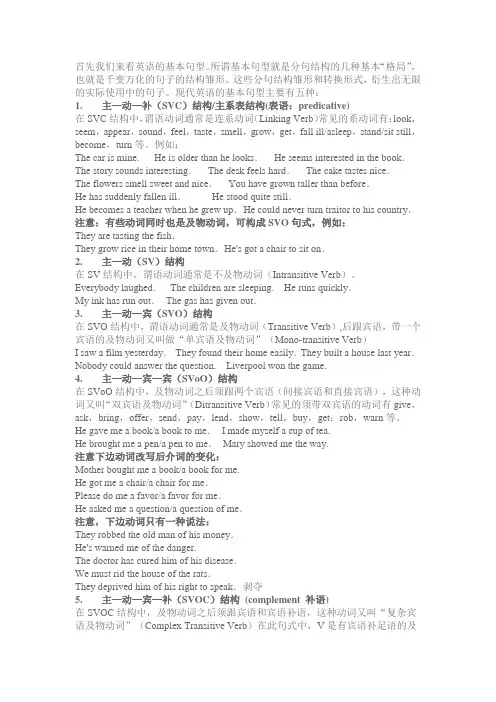
首先我们来看英语的基本句型。
所谓基本句型就是分句结构的几种基本“格局”,也就是千变万化的句子的结构雏形。
这些分句结构雏形和转换形式,衍生出无限的实际使用中的句子。
现代英语的基本句型主要有五种:1. 主—动—补(SVC)结构/主系表结构(表语:predicative)在SVC结构中,谓语动词通常是连系动词(Linking Verb)常见的系动词有:look,seem,appear,sound,feel,taste,smell,grow,get,fall ill/asleep,stand/sit still,become,turn等。
例如:The car is mine. He is older than he looks.He seems interested in the book.The story sounds interesting.The desk feels hard.The cake tastes nice.The flowers smell sweet and nice.You have grown taller than before.He has suddenly fallen ill.He stood quite still.He becomes a teacher when he grew up.He could never turn traitor to his country.注意:有些动词同时也是及物动词,可构成SVO句式,例如:They are tasting the fish.They grow rice in their home town.He's got a chair to sit on.2. 主—动(SV)结构在SV结构中,谓语动词通常是不及物动词(Intransitive Verb)。
Everybody laughed. The children are sleeping. He runs quickly.My ink has run out.The gas has given out.3. 主—动—宾(SVO)结构在SVO结构中,谓语动词通常是及物动词(Transitive Verb),后跟宾语,带一个宾语的及物动词又叫做“单宾语及物动词”(Mono-transitive Verb)I saw a film yesterday.They found their home easily.They built a house last year.Nobody could answer the question. Liverpool won the game.4. 主—动—宾—宾(SVoO)结构在SVoO结构中,及物动词之后须跟两个宾语(间接宾语和直接宾语),这种动词又叫“双宾语及物动词”(Ditransitive Verb)常见的须带双宾语的动词有give,ask,bring,offer,send,pay,lend,show,tell,buy,get;rob,warn等。
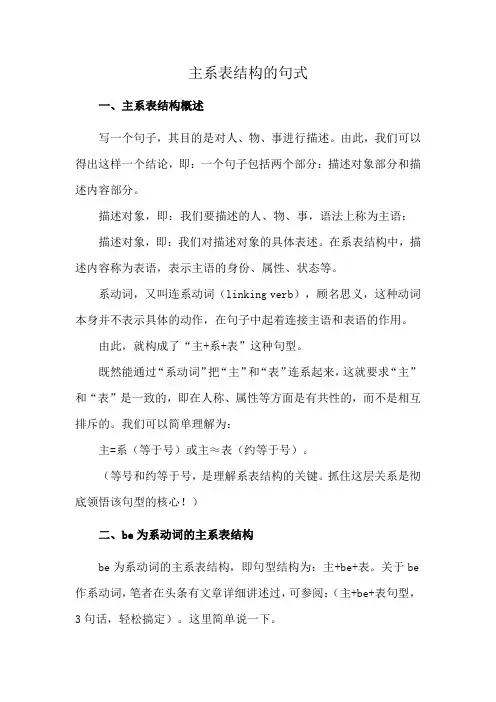
主系表结构的句式一、主系表结构概述写一个句子,其目的是对人、物、事进行描述。
由此,我们可以得出这样一个结论,即:一个句子包括两个部分:描述对象部分和描述内容部分。
描述对象,即:我们要描述的人、物、事,语法上称为主语;描述对象,即:我们对描述对象的具体表述。
在系表结构中,描述内容称为表语,表示主语的身份、属性、状态等。
系动词,又叫连系动词(linking verb),顾名思义,这种动词本身并不表示具体的动作,在句子中起着连接主语和表语的作用。
由此,就构成了“主+系+表”这种句型。
既然能通过“系动词”把“主”和“表”连系起来,这就要求“主”和“表”是一致的,即在人称、属性等方面是有共性的,而不是相互排斥的。
我们可以简单理解为:主=系(等于号)或主≈表(约等于号)。
(等号和约等于号,是理解系表结构的关键。
抓住这层关系是彻底领悟该句型的核心!)二、be为系动词的主系表结构be为系动词的主系表结构,即句型结构为:主+be+表。
关于be 作系动词,笔者在头条有文章详细讲述过,可参阅:(主+be+表句型,3句话,轻松搞定)。
这里简单说一下。
be无实际意义,仅起连系主表作用,但不可丢失。
这一点对于初学者尤其需要重视。
描述对象是人、物、事,比较容易理解,对于描述对象(表语),这里总结出三种最简单,也是最需要掌握的表语。
1、表语来表示主语“是什么”例句:我哥是老师。
My brother is a teacher.2、表语表示主语“怎么了”例句:我累了。
I am tired.3、表语表示主语“在哪里”例句:他的自行车在树下。
His bike is under the tree.总结:①在“主+be+表”结构中,be相当于“=”;②be千万不可丢,尤其是表语用来表示主语“怎么了”和“在哪里”这两种情况。
三、非be系动词的主系表结构be相当于“=”(等于号),那么非be就相当于“≈”(约等于号)。
所谓“≈”,即非be系动词:一则起着连系主表的作用;二则本身还有一定的含义。

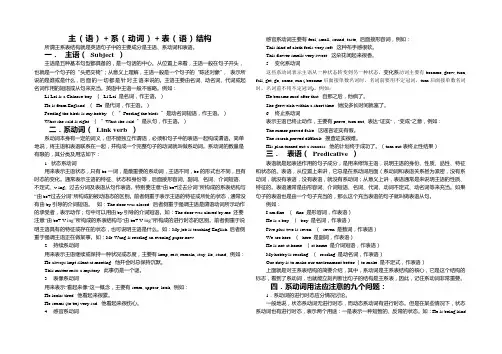
主(语)+系(动词)+表(语)结构所谓主系表结构就是英语句子中的主要成分是主语、系动词和表语。
一.主语(Subject )主语是五种基本句型都具备的,是一句话的中心。
从位置上来看,主语一般在句子开头,也就是一个句子的“头把交椅”;从意义上理解,主语一般是一个句子的“陈述对象”,表示所说的是谁或是什么,后面的一切都是针对主语来说的。
主语主要由名词、动名词、代词或起名词作用的短语或从句来充当。
英语中主语一般不省略。
例如:Li Lei is a Chinese boy. (Li Lei 是名词,作主语。
)He is from England. (He 是代词,作主语。
)Feeding the birds is my hobby. (“Feeding the birds ”是动名词短语,作主语。
)What she said is right. (“What she said ”是从句,作主语。
)二.系动词(Link verb )系动词本身有一定的词义,但不能独立作谓语,必须和句子中的表语一起构成谓语。
简单地说,将主语和表语联系在一起,并构成一个完整句子的动词就叫做系动词。
系动词的数量是有限的,其分类及用法如下:1. 状态系动词用来表示主语状态,只有be一词,是最重要的系动词,主语不同,be的形式也不同,且有时态的变化。
通常表示主语的特征、状态和身份等,后面接形容词、副词、名词、介词短语、不定式、v-ing、过去分词及表语从句作表语。
特别要注意“由be+过去分词”所构成的系表结构与“由be+过去分词”所构成的被动语态的区别。
前者侧重于表示主语的特征或所处的状态,通常没有由by引导的介词短语。
如:The door was closed. 后者侧重于强调主语是谓语动词所示动作的承受者,表示动作;句中可以用由by引导的介词短语。
如:The door was closed by me. 还要注意“由be+ V-ing”所构成的系表结构与“由be+ V-ing”所构成的进行时态的区别。
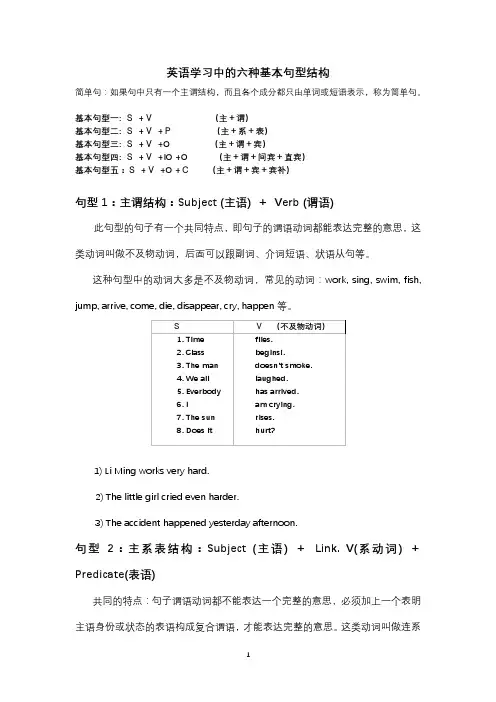
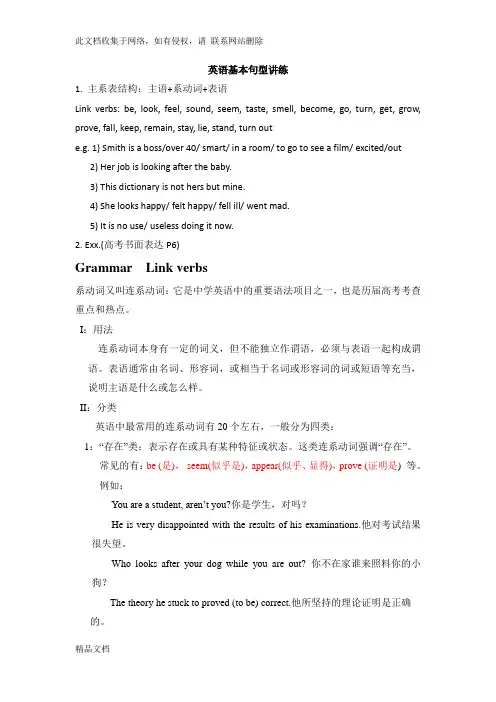
英语基本句型讲练1. 主系表结构:主语+系动词+表语Link verbs: be, look, feel, sound, seem, taste, smell, become, go, turn, get, grow, prove, fall, keep, remain, stay, lie, stand, turn oute.g. 1) Smith is a boss/over 40/ smart/ in a room/ to go to see a film/ excited/out2) Her job is looking after the baby.3) This dictionary is not hers but mine.4) She looks happy/ felt happy/ fell ill/ went mad.5) It is no use/ useless doing it now.2. Exx.(高考书面表达P6)Grammar Link verbs系动词又叫连系动词:它是中学英语中的重要语法项目之一,也是历届高考考查重点和热点。
I:用法连系动词本身有一定的词义,但不能独立作谓语,必须与表语一起构成谓语。
表语通常由名词、形容词,或相当于名词或形容词的词或短语等充当,说明主语是什么或怎么样。
II:分类英语中最常用的连系动词有20个左右,一般分为四类:1:“存在”类:表示存在或具有某种特征或状态。
这类连系动词强调“存在”。
常见的有:be (是),seem(似乎是),appear(似乎、显得),prove (证明是) 等。
例如:You are a student, aren’t you?你是学生,对吗?He is very disappointed with the results of his examinations.他对考试结果很失望。
Who looks after your dog while you are out? 你不在家谁来照料你的小狗?The theory he stuck to proved (to be) correct.他所坚持的理论证明是正确的。
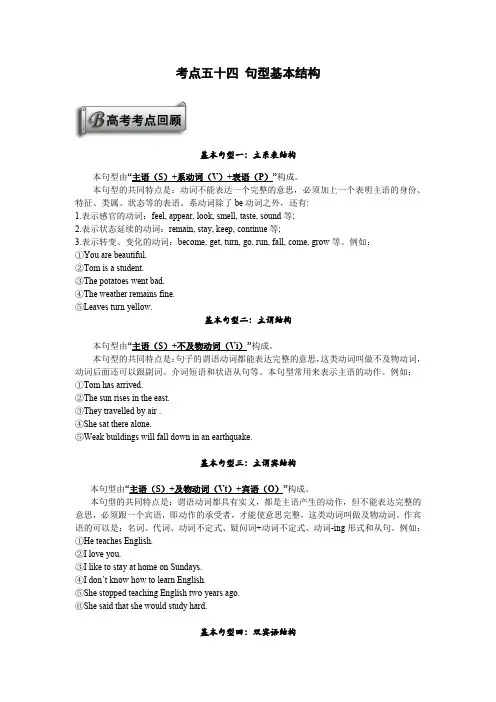
考点五十四句型基本结构基本句型一:主系表结构本句型由“主语(S)+系动词(V)+表语(P)”构成。
本句型的共同特点是:动词不能表达一个完整的意思,必须加上一个表明主语的身份、特征、类属、状态等的表语。
系动词除了be动词之外,还有:1.表示感官的动词:feel, appear, look, smell, taste, sound等;2.表示状态延续的动词:remain, stay, keep, continue等;3.表示转变、变化的动词:become, get, turn, go, run, fall, come, grow等。
例如:①You are beautiful.②Tom is a student.③The potatoes went bad.④The weather remains fine.⑤Leaves turn yellow.基本句型二:主谓结构本句型由“主语(S)+不及物动词(Vi)”构成。
本句型的共同特点是:句子的谓语动词都能表达完整的意思,这类动词叫做不及物动词,动词后面还可以跟副词、介词短语和状语从句等。
本句型常用来表示主语的动作。
例如:①Tom has arrived.②The sun rises in the east.③They travelled by air .④She sat there alone.⑤Weak buildings will fall down in an earthquake.基本句型三:主谓宾结构本句型由“主语(S)+及物动词(Vt)+宾语(O)”构成。
本句型的共同特点是:谓语动词都具有实义,都是主语产生的动作,但不能表达完整的意思,必须跟一个宾语,即动作的承受者,才能使意思完整,这类动词叫做及物动词。
作宾语的可以是:名词、代词、动词不定式、疑问词+动词不定式、动词-ing形式和从句。
例如:①He teaches English.②I love you.③I like to stay at home on Sundays.④I don’t know how to learn English.⑤She stopped teaching English two years ago.⑥She said that she would study hard.基本句型四:双宾语结构本句型由“主语(S)+及物动词(Vt)+间接宾语(IO)+直接宾语(DO)”组成。
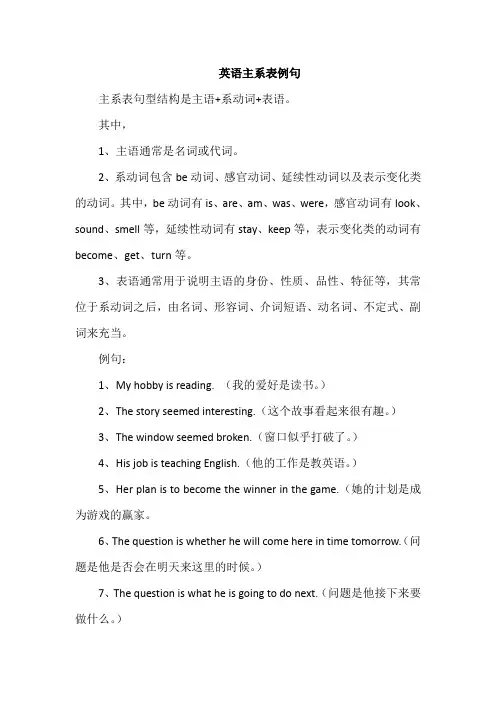
英语主系表例句主系表句型结构是主语+系动词+表语。
其中,1、主语通常是名词或代词。
2、系动词包含be动词、感官动词、延续性动词以及表示变化类的动词。
其中,be动词有is、are、am、was、were,感官动词有look、sound、smell等,延续性动词有stay、keep等,表示变化类的动词有become、get、turn等。
3、表语通常用于说明主语的身份、性质、品性、特征等,其常位于系动词之后,由名词、形容词、介词短语、动名词、不定式、副词来充当。
例句:1、My hobby is reading. (我的爱好是读书。
)2、The story seemed interesting.(这个故事看起来很有趣。
)3、The window seemed broken.(窗口似乎打破了。
)4、His job is teaching English.(他的工作是教英语。
)5、Her plan is to become the winner in the game.(她的计划是成为游戏的赢家。
6、The question is whether he will come here in time tomorrow.(问题是他是否会在明天来这里的时候。
)7、The question is what he is going to do next.(问题是他接下来要做什么。
)8、The question is how he has managed to solve the problem by himself.(问题是他是如何设法自己解决问题。
)9、Joy turned doctor after school.(乔伊毕业后当了医生。
)10、The leaf will turn yellow in autumn.(树叶在秋天会变黄。
)。
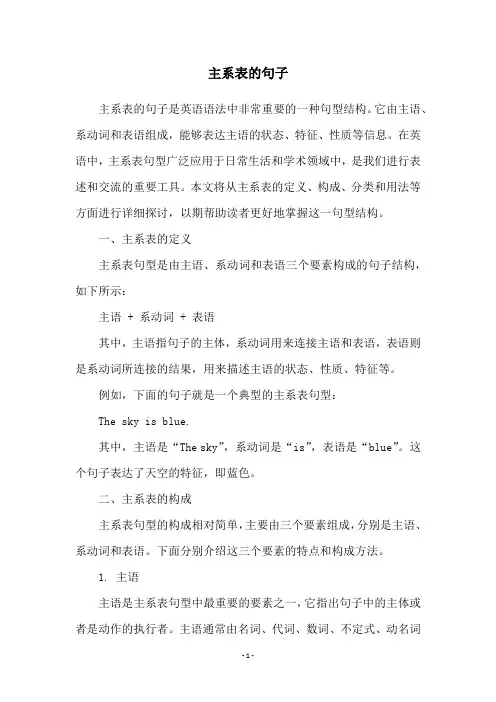
主系表的句子主系表的句子是英语语法中非常重要的一种句型结构。
它由主语、系动词和表语组成,能够表达主语的状态、特征、性质等信息。
在英语中,主系表句型广泛应用于日常生活和学术领域中,是我们进行表述和交流的重要工具。
本文将从主系表的定义、构成、分类和用法等方面进行详细探讨,以期帮助读者更好地掌握这一句型结构。
一、主系表的定义主系表句型是由主语、系动词和表语三个要素构成的句子结构,如下所示:主语 + 系动词 + 表语其中,主语指句子的主体,系动词用来连接主语和表语,表语则是系动词所连接的结果,用来描述主语的状态、性质、特征等。
例如,下面的句子就是一个典型的主系表句型:The sky is blue.其中,主语是“The sky”,系动词是“is”,表语是“blue”。
这个句子表达了天空的特征,即蓝色。
二、主系表的构成主系表句型的构成相对简单,主要由三个要素组成,分别是主语、系动词和表语。
下面分别介绍这三个要素的特点和构成方法。
1. 主语主语是主系表句型中最重要的要素之一,它指出句子中的主体或者是动作的执行者。
主语通常由名词、代词、数词、不定式、动名词或从句等构成。
例如:My sister is a teacher.She is reading a book.To learn English is important.Swimming is good for health.That he is coming is certain.2. 系动词系动词是主系表句型中的连接词,它用来连接主语和表语,起到承上启下的作用。
系动词通常有be动词(am, is, are, was, were 等)、感官动词(look, feel, smell, taste, sound等)和状态动词(become, seem, appear, remain等)等。
例如:He is a good student.The roses smell fragrant.She looks happy.The weather became cold.3. 表语表语是主系表句型中描述主语状态、性质、特征等的重要要素。
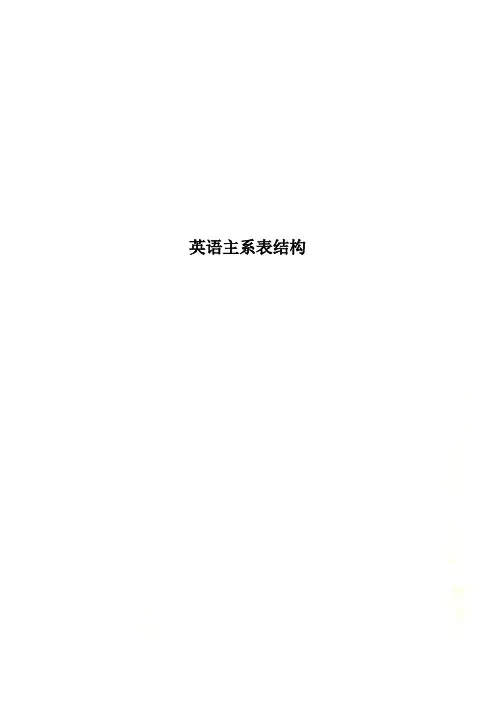
英语主系表结构五种基本句型——主系表结构主(语)+系(动词)+表(语)主语,主语是五种基本句型都具备的。
从位置上来看,主语一般在句子开头,也就是一个句子的“头把交椅”。
从意义上理解,主语一般是一个句子的“陈述对象”,后面的一切都是针对主语来说的。
主语一般是名词或代词(当然还有其他,这里暂且详细讨论)系动词是联系动词的简称,顾名思义,它是起到联系作用的动词,是连接主语和表语的。
系动词的数量是有限的,常见的只有十来个,我们把它们分成四组,这样有助于我们记忆系动词:一、be动词类:am、is 、are 、was 、were二、表示变化类:become、get 、turn 、grow 、go三、感官动词类: 眼(look )耳(sound)鼻(smell)舌(taste)身(feel)四、表示延续性的动词:remain 、stay 、keep表语从位置上来讲,它总是在系动词后面(系动词和表语关系甚为紧密,没有系动词,就没有表语:没有表语,就没有系动词。
二从意义上讲,表语通常是来说明主语的性质、特征的。
表语通常是由形容词、介词短语、名词、代词、动词不定式、doing 等来充当。
上面就是对主系表结构的简要介绍,其中,系动词是主系表结构的核心,它是这个结构的标志,看到了系动词,也就能立刻判断出句子的结构是主系表,因此,记住系动词非常重要。
练习找出下面句子中的主语、系动词及表语,并指出主语和表语分别是由什么词性或词类来充当的。
1 Tom is a student.2 He is fat.3 I am tired .4 We are students.5 The bag was lost .6 The boy was foolish .7 They were kind.8 She is in the room.9 The books are on the desk.10 Snow is white.11 Kate was here yesterday.12 My father became a teacher in 1978.13 The weather gets hot in summer.14 She looks beautiful.15 The flower smells good.16 We were very happy.17 You are right.18 The soup tastes delicious.19 The chair is yours.20 The children are asleep.21 The story is interesting.22 He feels better today.23 The leaf turns green.24 I stayed awake all the night.25 The weather still remained cold in April.26 The little girl is six.27 My work is to look after the baby.28 His job is taking care of the patient.29 The girl is very pretty.30 He went mad.31 Please don’t get angry.32 The weather is getting colder and colder.33 You look angry.34 She looks like her mother.35 You look unhappy, what’s the matter?36 Those roses smell beautiful.37 This tastes nice. What’s in it?38 Do you feel happy?39 He remained silent.40 The weather is going to stay fine.41 M y job is teaching English.42 She is at home.43 I feel terrible.44 He is older than he looks.他比看上去要老。
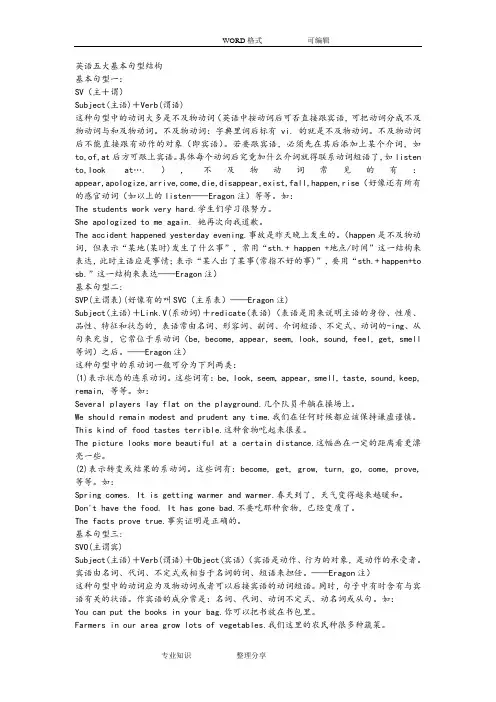
英语五大基本句型结构基本句型一:SV(主+谓)Subject(主语)+Verb(谓语)这种句型中的动词大多是不及物动词(英语中按动词后可否直接跟宾语,可把动词分成不及物动词与和及物动词。
不及物动词:字典里词后标有vi. 的就是不及物动词。
不及物动词后不能直接跟有动作的对象(即宾语)。
若要跟宾语,必须先在其后添加上某个介词,如to,of,at后方可跟上宾语。
具体每个动词后究竟加什么介词就得联系动词短语了,如listen to,look at….),不及物动词常见的有:appear,apologize,arrive,come,die,disappear,exist,fall,happen,rise(好像还有所有的感官动词(如以上的listen——Eragon注)等等。
如:The students work very hard.学生们学习很努力。
She apologized to me again. 她再次向我道歉。
The accident happened yesterday evening.事故是昨天晚上发生的。
(happen是不及物动词,但表示“某地(某时)发生了什么事”,常用“sth.+ h appen +地点/时间”这一结构来表达,此时主语应是事情;表示“某人出了某事(常指不好的事)”,要用“sth.+ happen+to sb.”这一结构来表达——Eragon注)基本句型二:SVP(主谓表)(好像有的叫SVC(主系表)——Eragon注)Subject(主语)+Link.V(系动词)+redicate(表语)(表语是用来说明主语的身份、性质、品性、特征和状态的,表语常由名词、形容词、副词、介词短语、不定式、动词的-ing、从句来充当,它常位于系动词(be, become, appear, seem, look, sound, feel, get, smell 等词)之后。
——Eragon注)这种句型中的系动词一般可分为下列两类:(1)表示状态的连系动词。
高中英语五种基本句型详解句子由主语和谓语两大部分组成。
主语结构比较单一,谓语结构则不然,不同类别的谓语动词导致不同的谓语结构,从而形成了不同的句型(Sentence Pattern)。
换句话说,不同的句型是由不同类别的谓语动词所决定的,因此,句型又被称为动词句型(Verb Pattern)。
语法家们对句型的分类不尽相同,一般认为,现代英语的基本句型主要有五种: 1.“主----系-----表”(SLP)句型:S十V十P主系表结构 在这种句型中,谓语动词是以be为主的连系动词(Linking Verb),后面跟主语补语(Subject Complement),如: These oranges have kept fresh. 这些桔子一直很新鲜。
Mary is a student / here /in the room. 玛丽是个学生/在这儿/在房间里。
2.“主----动”(SV)句型:S十V主谓结构 在这种句型中,谓语动词为不及物动词(Intransitive Verb),谓语部分通常只包括限定动词,即使有状语,也属任意性状语,即:去掉后并不影响句子结构和意义的完整,如: This bread won’t keep (for a long time). 这种面包不好(长期)存放。
Tom has left. 3.“主----动-----宾”(SVO)句型:S十V十O主谓宾结构 He kept the money. 他保存着这些钱。
They have left the hotel. 他们已经离开了那家旅馆。
在这种句型中,状语通常也不是必不可少的,但有少数几个及物动词的某些用法要求必具性状语,从而形成了“主----动-----宾-----状”(SVOA)这一在五种基本句型之外的另一种句型,如: The train leaves London at nine. 这列火车九点钟驶离伦敦。
4.“主----动----间宾-----直宾” 句型: S十V十O1十O2 主谓双宾结构 在这一句型中,谓语动词为能带一个间接宾语和一个直接宾语的及物动词,这类动词被称为双宾语及物动词(Ditransitive Verb),如: He kept me a dictionary. 他为我保存了一本词典。
(完整版)主系表结构讲解主系表结构是英语语法中的一种句型结构,它由主语、系动词和表语构成。
本文将对主系表结构进行详细讲解。
一、主系表结构概述主系表结构是一种简洁明了的句子结构,在表达清楚、简洁的同时强调了主语的状态、特点或属性。
主系表结构中的系动词起到连接主语和表语的作用,起到了强调和说明主语状态的作用。
二、主系表结构的组成部分主系表结构由三个基本组成部分构成:1. 主语:句子中的主语是实施或经历动作的人或物,通常是一个名词或代词。
2. 系动词:系动词是主系表结构中的核心词汇,起到连接主语和表语的作用。
常见的系动词有is、am、are、was、were等。
3. 表语:表语是系动词的补充,用来说明主语的状态、特点或属性。
表语通常是一个形容词、名词或者介词短语。
三、主系表结构的用法主系表结构常用于陈述句和疑问句中,用来表达主语的状态、特点或属性。
比如:1. 陈述句:- My sister is tall.(我的姐姐个子高。
)- The book is interesting.(这本书很有趣。
)2. 疑问句:- Is he a doctor?(他是医生吗?)- Are you happy?(你开心吗?)四、主系表结构的变化形式主系表结构的句子形式可以根据需要变化。
一些常见的变化形式包括:1. 时态变化:根据具体的时间和语境,使用不同的系动词时态。
- She is reading a book.(她正在读一本书。
)- They were tired.(他们很累。
)2. 被动语态:将主系表结构转换为被动语态。
- The house is built by my father.(这座房子是我爸爸建的。
)- The cake was made by my mother.(这个蛋糕是我妈妈做的。
)3. 否定形式:在系动词前加否定词not。
- He is not happy.(他不开心。
)- They are not at home.(他们不在家。
高中英语五种基本句型详解句子由主语和谓语两大部分组成。
主语结构比较单一,谓语结构则不然,不同类别的谓语动词导致不同的谓语结构,从而形成了不同的句型(Sentence Pattern)。
换句话说,不同的句型是由不同类别的谓语动词所决定的,因此,句型又被称为动词句型(Verb Pattern)。
语法家们对句型的分类不尽相同,一般认为,现代英语的基本句型主要有五种:1.“主----系-----表”(SLP)句型:S十V十P主系表结构在这种句型中,谓语动词是以be为主的连系动词(Linking Verb),后面跟主语补语(Subject Complement),如:These oranges have kept fresh. 这些桔子一直很新鲜。
Mary is a student / here /in the room. 玛丽是个学生/在这儿/在房间里。
2.“主----动”(SV)句型:S十V主谓结构在这种句型中,谓语动词为不及物动词(Intransitive Verb),谓语部分通常只包括限定动词,即使有状语,也属任意性状语,即:去掉后并不影响句子结构和意义的完整,如:This bread won’t keep (for a long time). 这种面包不好(长期)存放。
Tom has left.3.“主----动-----宾”(SVO)句型:S十V十O主谓宾结构He kept the money. 他保存着这些钱。
They have left the hotel. 他们已经离开了那家旅馆。
在这种句型中,状语通常也不是必不可少的,但有少数几个及物动词的某些用法要求必具性状语,从而形成了“主----动-----宾-----状”(SVOA)这一在五种基本句型之外的另一种句型,如:The train leaves London at nine. 这列火车九点钟驶离伦敦。
4.“主----动----间宾-----直宾”句型: S十V十O1十O2 主谓双宾结构在这一句型中,谓语动词为能带一个间接宾语和一个直接宾语的及物动词,这类动词被称为双宾语及物动词(Ditransitive Verb),如:He kept me a dictionary. 他为我保存了一本词典。
五种基本句型例句如下:
英语基本句型一: 主系表结构
可以充当表语成分的有四类词,分别为名词、形容词、介词短语、副词。
下面我们就一起来看一下:
(1) 主语+ 系动词+ 名词(充当表语)
例句:That is the truth. 这就是事实。
(truth是名词“事实”的意思)
(2) 主语+ 系动词+ 形容词(充当表语)
例句:The news is amazing.这个消息令人吃惊。
(amazing是形容词“令人吃惊的”的意思)
(3) 主语+ 系动词+ 介词短语(充当表语)
例句1:Jeremy is from America.
杰瑞米来自美国(此时介词短语from America充当表语)。
例句2:I am in Beijing.
我在北京(此时介词短语in Beijing充当表语)。
(4) 主语+ 系动词+ 副词(充当表语)注:这种句式比较少见
例句1:The light is on.
5、主语+谓语+宾语+宾语补足语(即”主谓宾宾补“句型)
I heard her singing in the next room this time yesterday.
灯亮着。
(副词on充当表语,表示“亮着”的意思)。
例句2:The game is over.
游戏结束了。
(副词over充当表语,表示“结束”的意思)。
英语基本句型讲练1。
主系表结构:主语+系动词+表语Link verbs: be,look,feel,sound,seem,taste, smell,become, go,turn,get, grow,prove, fall,keep, remain, stay, lie,stand, turn oute。
g。
1) Smith is a boss/over 40/ smart/ in a room/ to go to see a film/ excited/out2) Her job is looking after the baby.3) This dictionary is not hers but mine.4) She looks happy/ felt happy/ fell ill/ went mad.5) It is no use/ useless doing it now。
2. Exx.(高考书面表达P6)Grammar Link verbs系动词又叫连系动词:它是中学英语中的重要语法项目之一,也是历届高考考查重点和热点。
I:用法连系动词本身有一定的词义,但不能独立作谓语,必须与表语一起构成谓语.表语通常由名词、形容词,或相当于名词或形容词的词或短语等充当,说明主语是什么或怎么样。
II:分类英语中最常用的连系动词有20个左右,一般分为四类:1:“存在”类:表示存在或具有某种特征或状态。
这类连系动词强调“存在”。
常见的有:be (是),seem(似乎是),appear(似乎、显得),prove (证明是)等。
例如:You are a student,aren't you?你是学生,对吗?He is very disappointed with the results of his examinations.他对考试结果很失望.Who looks after your dog while you are out?你不在家谁来照料你的小狗?The theory he stuck to proved (to be)correct。
英语基本句型及练习一. 英语基本句型 1.主系表结构(S+V+P)本结构是由主语+系动词+表语组成,主要用以说明主语的特征,类属,状态,身份等。
系动词有:1.表示特征和存在状态的:be,seem,feel,appear,look,smell,taste,sound;2.表示状态延续的:remain,stay,keep,continue,stand;3.表示状态变化的:become,get,turn,go,run,fall,come,grow;如:Our history teacher is thirty years old.The cake tastes delicious.We feel used to living in big cities.The potatoes went bad in the fields.Their boss seems satisfied with the work.Deep water stays still.巩固练习1:1.冬季白天短,夜晚长。
_____________________________________________________.2.十五岁他就成为有名的钢琴家了。
__________________________________________.3.孩子们很少保持安静。
____________________________________________________.4.她的工作是在幼儿园里照看儿童。
__________________________________________.5.他失业了。
______________________________________________________________.6. 没有了狗那个老人觉得有些孤单。
__________________________________________.7. 下雨的晚上最容易感到寂寞。
英语基本句型讲练1. 主系表结构:主语+系动词+表语Link verbs: be, look, feel, sound, seem, taste, smell, become, go, turn, get, grow, prove, fall, keep, remain, stay, lie, stand, turn oute.g. 1) Smith is a boss/over 40/ smart/ in a room/ to go to see a film/ excited/out2) Her job is looking after the baby.3) This dictionary is not hers but mine.4) She looks happy/ felt happy/ fell ill/ went mad.5) It is no use/ useless doing it now.2. Exx.(高考书面表达P6)Grammar Link verbs系动词又叫连系动词:它是中学英语中的重要语法项目之一,也是历届高考考查重点和热点。
I:用法连系动词本身有一定的词义,但不能独立作谓语,必须与表语一起构成谓语。
表语通常由名词、形容词,或相当于名词或形容词的词或短语等充当,说明主语是什么或怎么样。
II:分类英语中最常用的连系动词有20个左右,一般分为四类:1:“存在”类:表示存在或具有某种特征或状态。
这类连系动词强调“存在”。
常见的有:be (是),seem(似乎是),appear(似乎、显得),prove (证明是) 等。
例如:You are a student, aren’t you?你是学生,对吗?He is very disappointed with the results of his examinations.他对考试结果很失望。
Who looks after your dog while you are out? 你不在家谁来照料你的小狗?The theory he stuck to proved (to be) correct.他所坚持的理论证明是正确的。
The maths problem seems difficult. 这道数学题似乎很难。
She appears much younger than she really is. 她看上去比实际上年轻。
(be动词,其后面可以是名词、形容词、分词、副词、介词短语等作表语)2:感官(动词)类表示感情状态的五个感官动词:look看上去, feel摸起来, taste尝起来, smell闻起来, sound听起来: (它们一般不用进行时,也不用被动态)You looks very happy today, what’s the good news? 你今天看来很高兴,什么好消息?What you said sounds reasonable? 你说的话听起来很有道理。
The apple tastes good and sells well. 这苹果尝起来很甜,而且很好卖The dish smelled good(sweet).那道菜闻起来好香。
3:“持续”类:表示某种情况或状态的持续。
这类连系动词强调“持续”。
常见的有:remain(依然),keep(保持),stay(保持),continue(继续、仍旧),stand(处于某状况或情形)等。
例如:Why don't you put the meat in the fridge?It will stay fresh for several days.为什么不把肉放在冰箱里?那样可以保鲜好几天。
It's already ten in the morning. The store remains closed. What's the matter?已经10点了,这商店还关着门。
怎么回事?Keep still while I photograph you.我在给你照相时不要乱动。
The weather continued cold.天气持续寒冷。
My father continues in good health.我爸依旧身体健康The door stood open. 门开着。
4. “变化”类:表示由一种情况或状态变化成另一种情况或状态。
这类连系动词强调“变化”后的情况或状态。
常见的有:become (变成),turn (变成),grow (变得),go (变得)等。
例如:Put the fish in the fridge, or it will go bad in hot weather.把鱼放在冰箱里,否则会变坏的。
Spring comes and the trees turn green. 春天来了,树叶变绿了。
It is five years since he became a soldier.他参军五年了。
注意:1. 有些连系动词通常不用于被动语态和进行时态中。
如:feel,taste等词。
2. 一般情况下,连系动词主要跟形容词或分词作表语。
例如:Be careful when you cross this very busy street. If not, you may get run over bya car.3. 能跟名词作表语的连系动词常见的有:be, become, appear, seem, prove,remain和turn等。
The population growth in China remains a problem.中国的人口增长依然是个问题。
He went to New York in 1986, where some time later he became a writer.他1986年去了纽约,过了一段时间他在那成了一位作家。
注:t urn后跟(表示主语身份的)名词作表语时,不加冠词。
例如:Twenty years later, he turned teacher. 二十年后,他成了作家。
4. 连系动词也可跟不定式(to do / to be),常见的有:appear, seem, remain,prove, look等。
例如。
Having a trip abroad is certainly good for the old couple, but it remains to be seen whether they will enjoy it.出国旅游对这对老夫妇来说当然很好,但他们能否玩得愉快还有待看结果。
On the long journey, Peter proved to be a most interesting guide. We all hada wonderful time. 在这次长途旅行中,皮特证明是一位很有趣的导游。
我们都玩得很开心。
Exercises (A)高考链接1. The traffic lights __________ green and I pulled away. (2006广东)A. cameB. grewC. gotD. went2. The flowers ____ sweet in the botanic garden attract the visitors to the beauty of nature.(04上海)A. to smellB. smellingC. smeltD. to be smelt3. -I was wondering if we could go skiing on the weekend.-_______good. (2006湖北)A. SoundB. SoundedC. SoundingD. Sounds4. Someone who lacks staying power and perseverance is unlikely to ___ a goodresearcher. (2006山东) A. make B. turn C. getD. grow5. Tom sounds very much __________ in the job, but I’m not sure whether he canmanage it. (2006安徽)A. interestedB. interestingC. interestinglyD.interestedly6. Having a trip abroad is certainly good for the old couple, but itremains ______whether they will enjoy it. (2002全国) A. to see B.to be seen C. seeing D. seen7. The water _____ cool when I jumped into the pool for morning exercise. (2006全国)A. was feltB. is feltC. feltD. feels8. Why don’t you put the meat in the fridge? It will _____ fresh for several days. (2003全国)A. be stayedB. stayC. be stayingD. have stayed9. The pilot asked all the passengers on board to remain _____ as the plane wasmaking a landing. (2004上海春) A. seat B. seating C. seated D. to be seating10. Be careful when you cross this very busy street. If not, you may _____ runover by a car. (2002北京) A. have B. get C. become D.passed11. Happy birthday, Alice. So you have _____ twenty-one already. (2004天津)A. becomeB. turnedC. grownD. passed12. Sarah, hurry up. I’m afraid you can’t have time to _____ before the party. (2004全国Ⅱ)A. get changedB. get changeC. get changingD. get to change13. On hearing the news of the accident in the coal mine, she _____ pale. (2004湖北)A. gotB. changedC. wentD. appeared14. Emergency line operators must always calm and make sure thatthey get all the information they need to send help.(07湖北)A. growB. appearC. becomeD. stay15.Please remain______ until the plane has come to a complete stop. (07山东) A.to seal B.to be seated C.seating D.seated16.-Mummy, can I put the peaches in the cupboard?-No, dear. They don’t ___ well. Put them in the fridge instead.(02北京)A. keepB. fitC. getD. last17. My parents have always made me about myself, even when I wastwelve(07江苏)A. feeling wellB. feeling goodC. feel wellD. feel good18. -Do you like the material?-Yes, it _____ very soft. ((94全国) A. is feeling B. felt C. feels D. is felt19. What he said sounds_______. (1993上海)A. nicelyB. pleasantlyC. friendlyD. wonderfully20. Although he has taken a lot of medicine, his health _____ poor. (2002春上海)A. provesB. remainsC. maintainsD. continues21.—Do you like the material?—Yes, it _____ very soft. (1994全国)A. is feelingB. feltC. feelsD. is felt(B)巩固训练1. He turned ____ ten years ago but later he became _____.A. a teacher; a doctorB. teacher; doctorC. teacher; a doctorD. a teacher; doctor2. The dog _____lost yesterday.A. gotB. becameC. turnedD. fell3. The old man must have ____ mad.A. goneB. turnedC. fallenD. driven4. I am afraid the weather will _____ hot for a few days.A. lastB. be lastedC. stayD. be stayed5. I love to go to the seaside in summer. It _____ good to lie in the sun or swim in the cool sea.A. doesB. feelsC. getsD. makes6. It was so large a hall that a hundred people looked ___ in it.A. losingB. lostC. to loseD. having lost7. As time went on, the theory he stuck ______ correct.A. to provingB. to proveC. to provedD. proved8.-Why do you look so sad?-There are many problems _________.A. remaining to settleB. remained to settleC. remaining to be settledD. remained to be settled9.After the big flood, very little ______ in the house.A. keptB. remainedC. leftD. continued10. ________________, the bananas sold well.A. Looking nice and tasting goodB. looked nice and tasted goodC. Looking nicely and tasting wellD. Being looked nice and tasted good答案:1—5 DBDAA 6—10 BCBCB 11—15 BACDD 16—20 ADCCB Key: 1—5 CAACB 6—10 BCCBAThere be 结构:历年高考真题与提升训练选编1.____ is no need for us to discuss the problem again since it has already beensettled.(1991上海)A.It has B. There has C. It is D. There is2. What a pity my new computer doesn’t work. _____ must be something wrongwith it.(1999 A. It B. There C. This D. That3. Since you have repaired my TV set, _____ is no need for me to buy a newone.(2002上海春 A. it B. there C. this D. that4. _____ ought to be no trouble because he knew the answers.A. ItB. ThereC. HeD. That5.There seems to be something wrong about it,______?A. wasn’t thereB. isn’t itC. doesn’t itD. doesn’t there6. The waiter spilled wine on the carpet but ____ was no harm done.A. thisB. itC. thatD. there7. There _____ no buses, we had to go home on foot.A. areB. wereC. beingD. to be8. Once upon a time______ a poor farmer who had four sons.A. there livedB. there hadC. it hadD. they had9. ________ great changes in our school since last year.A. There wereB. There had beenC. There have hadD. There havebeen10. There ____two apples, one watermelon and some bananas in the basket.A. wasB. isC. hasD. areKey: 1—5 DBBBD 6—10 DCADDB. There + be+主语(存在句型)专练1. 英语中的there be 结构主要表示某处存在某物,通常还被称为存在句。